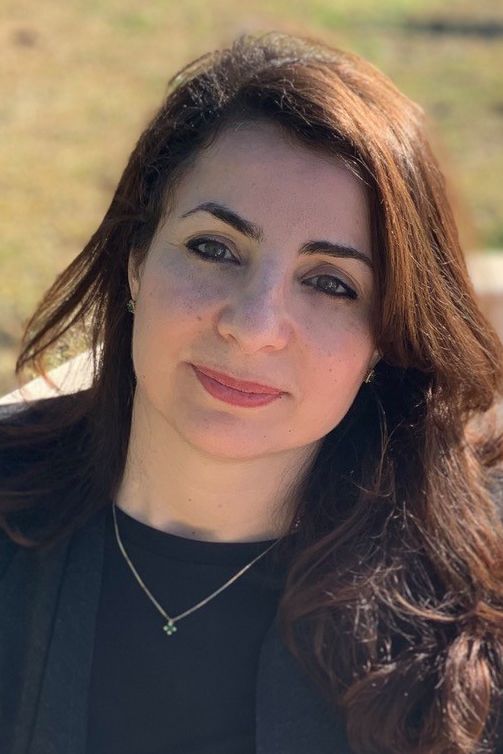

Dr Maha Shuayb appointed to British Academy Bilateral Chair
Programme will focus on unpacking the policy, practice and research of education of refugee children in the global north and south.
Dr Maha Shuayb, who is Director of the Centre for Lebanese Studies and an eminent scholar of education in emergencies, refugee education and education reform, has been appointed to a British Academy Bilateral Research Chair shared with the Faculty of Education. The three-year appointment funded by the UK’s Foreign, Commonwealth and Development Office (FCDO) and forms one part of a wider Education Research in Conflict and Protracted Crisis (ERICC) programme. ERICC is a six-year programme (2021-2027) with the objective of delivering and maximising uptake of new, operationally- and policy-relevant evidence on “what works” to deliver education to children affected by conflict and protracted crises.
As Bilateral Research Chair, Dr Shuayb will help to develop networks, mobility and exchange between institutions and will play an active role in developing the research capacity, profile and sustainability of the institutions involved and their future researchers. Delivering programmes of institutional strengthening, they will address the challenges of building research and institutional strength in areas of conflict and crisis.

"I am excited to be back at the Faculty of Education and to be working closely with colleagues on advancing critical work on education in conflict"
As a part of this work, they will also link with the main ERICC research consortium, led by the International Rescue Committee UK. Dr Shuayb will lead a programme of research examining “educational policies in response to refugees entering diverse settings over the past decade”. This will aim to generate evidence informing future approaches to providing education in conflict situations.
Dr Shuayb is a graduate of the Faculty of Education and has a long-standing relationship with the Faculty, where she has twice held visiting Fellowships. She has been Director of CLS at the Lebanese American University, which is a highly respected independent academic institution researching education, refugee rights, social movements and disability advocacy; for more than 10 years. She has undertaken extensive research on the educational response for Syrian refugees in Lebanon, Jordan and Palestine, and has also researched the educational experience of other refugee groups.
Dr Shuayb’s chair will facilitate one of the first research programmes to combine an appreciation of the ground-level impacts of education policy-making in Lebanon in response to the influx of Syrian refugees, with a systematic, macro-level view of how that policy was developed by global actors to service their agendas. To date, most research on this subject has examined the experiences of refugees and teachers or policy on a national level; very little has been done to survey the global policy context including donors governments and humanitarian agencies.
Since the outbreak of violence in Syria in 2011, Lebanon has absorbed very large numbers of refugees. It currently hosts around one million – approximately 15% of its total population. At the same time, it is enduring the worst economic crisis since the end of its own civil war in 1990.
Providing education to refugee children has been a central focus of the humanitarian response. Unlike previous crisis response programmes in the region, which were shaped and dominated by a combination of global donor governments, UN agencies and local Lebanese, Syrian and Palestinian non-governmental actors, the Lebanese government has, in this case, played a central role. However, despite these efforts education attainment for refugee children continues to be dismal, prompting further exploration of the impact of current discourses on education of refugee children in humanitarian circles.
Another important dimension of Dr Shuayb’s project will focus on the research industry of refugee education: in particular knowledge production and research partnerships between institutes and academics in the global north and the global south. Through a series of fellowships, summer schools, seminars and research replacements, podcasts, the programme hopes to encourage a critical and reflective dialogue between academics and emerging scholars as well as policy makers, and practitioners in the field.
The programme will also create new opportunities for exchange and collaboration between scholars in Lebanon, Jordan and the UK; in particular those at the early stage of their academic careers. Alongside this, a new “Research, Policy and Practice Education Hub” will be created, which will act as a platform for promoting knowledge exchange and dialogue with policy actors, researchers and education practitioners, encouraging the application and implementation of the evidence and insights generated through the research.
The bilateral research chair will be closely linked to the work of both the Faculty’s REAL Centre and the Knowledge, Power and Politics in Education Research Group and more broadly with the University Centre for the Study of Global Human Movement.
Dr Shuayb said: “I am excited to be back at the Faculty of Education and to working closely with colleagues on advancing critical work on education in conflict in particular strengthening equitable research collaborations between the global north and south and supporting a space for dialogue between research, policy and practice”.
Professor Ricardo Sabates, Director of Research at the Faculty of Education, said: “This is a fantastic affiliation to the Faculty and a wonderful opportunity for us to benefit from Dr Shuayb’s expertise and that of CLS. Her programme will not only strengthen our existing work in the field of education in conflict and emergencies, but create new relationships and connections with academic partners who can bring a new depth of insight to that work.”
Mr Basim Ziade, Chairperson at the Centre for Lebanese Studies, said: “We are delighted to co-host the BA Bilateral Chair at the Centre for Lebanese Studies at the Lebanese American University. For the past 35 years, CLS have been working on advancing academic research in the region particularly in the field of education. We also look forward to working together with the University of Cambridge on showcasing equitable research partnerships between institutions from the global north and global south”.